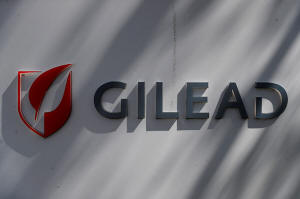Gilead's Trodelvy fails to meet main goal in lung cancer trial
 Send a link to a friend
Send a link to a friend
 [January 23, 2024]
By Deena Beasley [January 23, 2024]
By Deena Beasley
(Reuters) -Gilead Sciences said on Monday its drug, Trodelvy, failed to
significantly improve survival for previously treated patients with
advanced non-small cell lung cancer (NSCLC) in a late-stage study,
sending its shares down more than 10%.
The California-based drugmaker was testing Trodelvy, which belongs to a
class of treatments known as antibody drug conjugates, in patients with
both squamous and non-squamous NSCLC - the most common type of lung
cancer.
Roughly 230,000 adults in the United States were estimated to be
diagnosed with lung cancer in 2023, and NSCLC accounts for 81% of all
those diagnoses, according to the American Society of Clinical Oncology.
The Phase 3 study, aimed at expanding the use of the treatment, showed
that patients with NSCLC who were treated with Trodelvy lived longer
than those given chemotherapy, Gilead said. However, the difference was
not statistically significant, it added.
The data raises questions on Trodelvy's use as a later-line of
treatment, BMO Capital Markets analyst Evan Seigerman said. He added
that there was still opportunity for Gilead to command market share as
an initial treatment for NSCLC.

Gilead is also conducting Phase 2 and 3 trials of Trodelvy in
combination with Keytruda as an initial treatment for NSCLC patients.
The current trial involved 603 patients with metastatic or advanced
NSCLC that had worsened during or after the current standard treatment
regimen of platinum-based chemotherapy and a checkpoint inhibitor, such
as Merck's Keytruda.
[to top of second column]
|

A Gilead Sciences, Inc. logo is seen outside the company
headquarters in Foster City, California, U.S. May 1, 2018.
REUTERS/Stephen Lam/File Photo
 Gilead said it plans to discuss the
results with regulators and present the full data at an upcoming
medical meeting.
The trial showed a more than three-month survival benefit for a
sub-group of patients who had not responded to their last prior
checkpoint inhibitor treatment, Gilead said.
The company plans to explore potential pathways to understand the
drug's effect for those patients.
The Phase 3 front-line trial is currently enrolling patients and
results will not be available for "a couple of years at least,"
Merdad Parsey, Gilead's chief medical officer, told Reuters.
The latest data "gives us continued confidence in Trodelvy's
potential in metastatic NSCLC, and in our broader lung cancer
clinical development program," he said.
Parsey said Trodelvy's safety profile was consistent with prior
studies, with the most common adverse events being neutropenia, or
low white blood cell counts, and diarrhea.
Trodelvy is currently approved by U.S. regulators for patients with
two specific types of advanced breast cancer and bladder cancers. It
brought in sales of $765 million in the first nine months of last
year.
(Reporting by Deena Beasley and Pratik Jain; Editing by Christopher
Cushing and Anil D'Silva)
[© 2024 Thomson Reuters. All rights reserved.]This material may not be published,
broadcast, rewritten or redistributed.
Thompson Reuters is solely responsible for this content. |